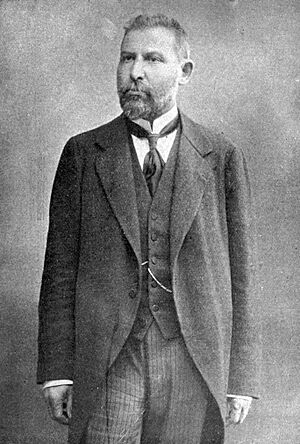Abdullah Cevdet facts for kids
Quick facts for kids
Dr.
Abdullah Cevdet
|
|
|---|---|
 |
|
| Born | 9 September 1869 Arapgir, Ottoman Empire
|
| Died | 29 November 1932 (aged 63) |
| Resting place | Merkezefendi Cemetery, Istanbul |
| Nationality | Ottoman, Turkish |
| Citizenship | Ottoman Empire, then Turkey |
| Education | Medicine |
| Alma mater | Turkish Military Academy |
| Occupation | Physician, writer and intellectual |
| Movement | CUP (1895–1909), Committee of Union and Progress (1889–1908), Democratic Party (1908–1911) |
Abdullah Cevdet (born September 9, 1869 – died November 29, 1932) was an important thinker and doctor from the Ottoman Empire. He was a Kurdish intellectual. He helped start a group called the Committee of Union and Progress (CUP).
Abdullah Cevdet also wrote articles using the pen name "Bir Kürd" (meaning "A Kurd"). He wrote for newspapers like Meşveret and Kurdistan. These articles talked about Kurdish identity and pride. Later, in 1908, he joined the Democratic Party. This party later joined with the Freedom and Accord Party in 1911. He was also a translator and had many new ideas.
Life Story
Abdullah Cevdet's father was a doctor, and Abdullah followed in his footsteps. He studied medicine at the Military College in Istanbul. He became an eye doctor.
At first, he was a very religious Muslim. But he started to be interested in Western ideas about science and the world. He believed that society should keep some Islamic values. But he also thought that old religious rules might not fit the modern world.
From 1904 to 1932, he published his own magazine called İctihat. In this magazine, he shared his modern ideas. Because of his political activities, he was arrested and sent out of his country many times. He lived in European cities like Vienna, Geneva, and Paris.
His poems were similar to the Symbolist movement in France. Famous French writers, like Gustave Kahn, praised his work. He even met Theodor Herzl because one of his poems was published in a newspaper. After that, he helped Herzl by translating his letters into Turkish.
Working for Change
Abdullah Cevdet was one of the early Young Turks. Their main goal was to end the strict rule of Sultan Abdul Hamid II. In 1889, Cevdet and four other medical students started a group. This group later became the "Committee of Union and Progress" (CUP).
At first, the CUP didn't have political goals. But it soon became a political group. It led the Young Turk Revolution in 1908 against Sultan Abdul Hamid II. However, Abdullah Cevdet left the CUP after 1902. This was because the CUP started to focus too much on Turkish nationalism.
Instead, he promoted his ideas about secularism in his magazine İctihat. Secularism means keeping government and religion separate. He wrote articles supporting ideas that later became part of Atatürk's Reforms. These reforms included closing old religious schools and improving women's rights. In 1908, he joined the Ottoman Democratic Party. This party was against the CUP. In 1912, he suggested using the Latin alphabet for Turkish. This idea was not accepted at the time.
Abdullah Cevdet faced trials in the Ottoman Empire many times. Some of his writings were seen as disrespectful to Islam. Because of this, some people called him "the eternal enemy of Islam." His most famous trial was for defending the Baháʼí Faith in his magazine in 1922. For a short time between 1921 and 1922, he also worked for Kurdish independence.
Ideas on Religion and Science
Abdullah Cevdet wanted to combine religious ideas with scientific thinking. He believed that religion could still be a strong force in society. He studied many different thinkers, from ancient philosophers to modern scientists.
He tried to find ways that science and religion could agree. For example, he translated books about scientific materialism. He also looked at the works of medieval Muslim thinkers like Omar Khayyam and Rumi. He tried to connect their ideas with modern scientists like Charles Darwin. He even suggested that the Qur'an hinted at the theory of evolution.
He hoped that religious scholars would support his ideas. But they did not respond as he wished. He then explored other religious groups, like the Bektashi and the Baháʼí Faith. When these efforts didn't work out, he focused purely on his intellectual work.
Death
In his last years, Abdullah Cevdet was quite alone. He died at age 63 on November 29, 1932. His body was taken to Hagia Sophia for a religious funeral service. At that time, Hagia Sophia was still a mosque.
However, no one came forward to claim his coffin. Some religious conservatives said he "did not deserve" an Islamic funeral prayer. A famous writer named Peyami Safa made an appeal. After this, the funeral prayer was performed. City workers then took his body to the Merkezefendi Cemetery for burial.
See Also
Images for kids


